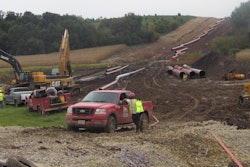
The shortage of skilled workers isn’t likely to subside anytime soon, and the pandemic that engulfed the world didn’t do any favors when recruiting more talent to the heavy construction industry. The labor shortage is among the most significant hurdles the civil construction industry has faced in a generation, if not longer.
Data in the latest issue of The Civil Quarterly (TCQ) from Dodge Data & Analytics reveals an increasing number of contractors say they have a high need to hire skilled workers. In fact, since the fourth quarter of 2020, the number jumped an astounding 17 points to 60%.
The labor shortage is affecting all contractors, even those with more moderate hiring needs. The Dodge data shows that 69% of contractors anticipate a high degree of difficulty finding workers, up 11 points since Q4 2020. More than eight in 10 civil contractors (81%) expect the cost of skilled workers will continue to increase.
While two-thirds anticipate a robust market in the next 12 months, nearly the same amount (65%) say they currently face challenges to meet schedules because of the skilled worker shortage. This shortage affects every aspect of the jobsite.
Consider that the same data reveals more than half (51%) are challenged to meet project budget requirements because of increased labor costs. Additionally, a similar number (49%) are submitting higher bids, an action that has the potential to significantly increase the costs of all projects, but especially the larger ones.
Left unchecked, these increased costs have a trickle-down effect for years to come and lead to significant ramifications for the entire industry. The result is a problem that contractors cannot afford to ignore.
Almost nine in 10 civil contractors (86%) express the need to draw more workers under 30 years old into the industry. Yet, those who increasingly say they need to attract these younger workers have the power to optimize their current resources and upskill their teams. But it necessitates the intelligent deployment of technology.
Think Differently About Labor and Productivity
Before the pandemic, a growing number of contractors were turning to technology. For example, the adoption of utility detection and drones increased, with equipment tagging and utility detection technology seeing the broadest adoption during the first half of 2021 compared to last year.
While the increases are noteworthy, using technology for virtual and augmented reality is an area for growth. The Dodge report revealed that fewer than 10% of contractors currently use such technologies.
Contractors should think about labor and their relationship with technology differently. Rather than focus on the labor they want and don’t have, focus on the available tools and how to use them to grow the productivity of existing talent. Technology optimizes workflows so less time-intensive work, or rework, is needed, increasing the capability of the existing workforce. In other words, technology is not killing jobs; it’s "skilling" jobs.
The silver lining of the pandemic is it forced civil contractors to re-evaluate their approach to the jobsite. Because of various mandates, companies needed to do more with less, and many turned to technology to make that possible.
When used correctly, virtual and augmented reality is a powerful tool. It enables any team member to view a 3D model and complete project tasks, ranging from applying ground markings to checking build progress against specifications.
With technology, individual workers can accomplish more, and entire teams will exponentially increase their productivity. The result is companies can spend less time looking for skilled workers and more time focused on completing jobs on time and on budget and preserving their profit margins.
Seize the Opportunity for More Training
It’s not a matter of making do with current resources; it’s about optimizing those resources and giving teams the tools to accomplish more. To do this, contractors should seize the opportunity to increase their training efforts.
An overwhelming majority (more than 75%) say training on community, leadership and digital skills coupled with site-specific safety issues is of moderate to high value for their on-site teams. However, only about a third (36%) have robust, ongoing training programs for new workers.
While training is a long-term investment, the increase in your teams’ skills will pay dividends for years and change organizations’ culture to be digital first.
There are broader workforce trends at play, as well. As part of “The Great Resignation,” upwards of 40% of workers might soon leave their jobs, and the trend doesn’t appear limited to any specific industry, potentially further compounding the tight labor market. Part of the reason some employees may be leaving is the desire for new skills and opportunities. The added benefits of expanding training is it will in all likelihood positively impact employee engagement and retention.
Adopt Technology and Upskill Workers
Technology has incredible benefits, starting with the increase in productivity. The skilled worker shortage won’t subside soon, so civil contractors need greater productivity from existing workers.
Technology also empowers contractors to onboard novice operators with ease, and the next generation of workers will have unparalleled ease when it comes to learning and using new technologies. Nearly two-thirds of civil contractors (63%) say younger talent brings diverse skills, including adopting technology more quickly and collaborating digitally.
As the industry evolves in a post-pandemic world, we cannot afford to return to old habits. Technology allows companies to look at projects in a new way. It is merely the latest evolution of the modern jobsite.


















